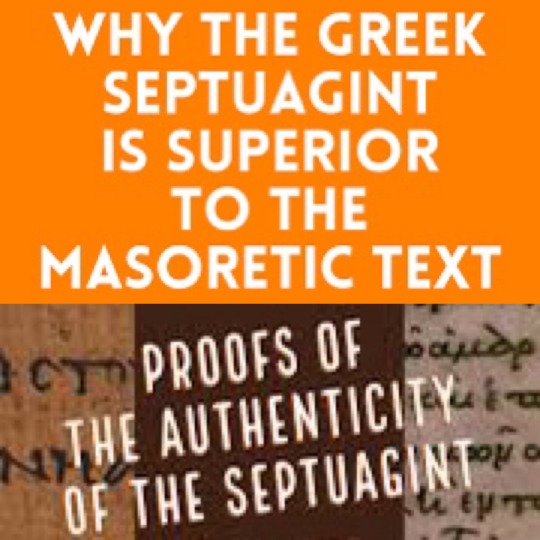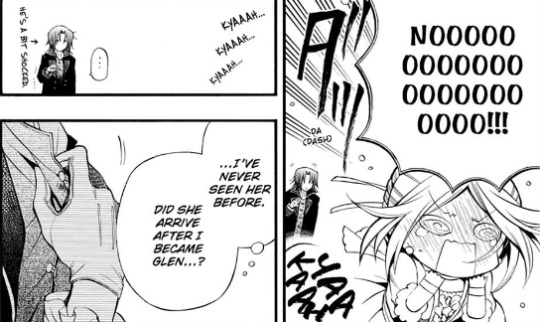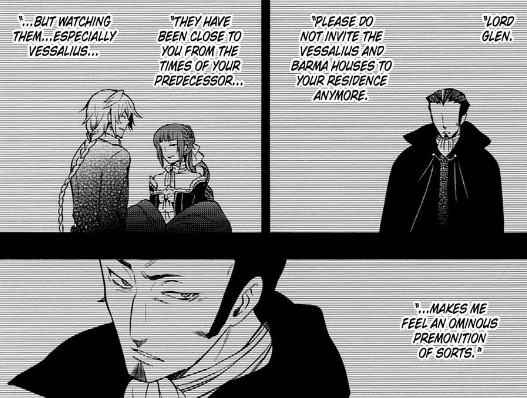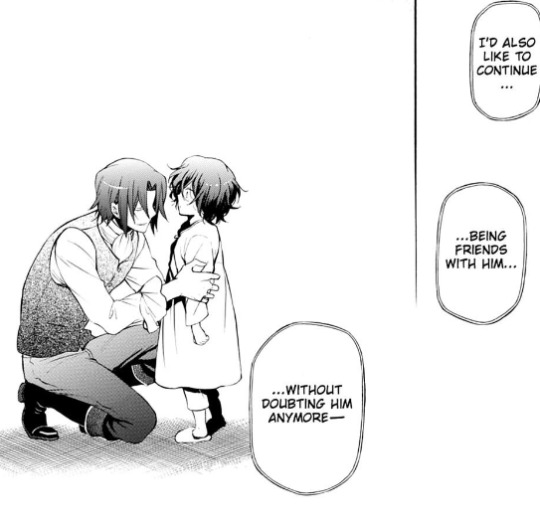#lxx
Text
A Biblical Greek Translation of Hebrews 9:26 that Changes Everything We Thought We Knew About Jesus
Eli Kittim
youtube
#biblical greek#koinegreek#newtestamentgreek#hebrews9v26#bible verse#ελικιτίμ#εκ#last days#το μικρό βιβλίο της αποκάλυψης#endtimes#eschatology#elikittim#youtube video#biblicalbombshell#end of the age#greekexegesis#bible translation#academicbiblestudies#concordancestudies#lxx#septuagint#συντελείατωναιώνων#thelittlebookofrevelation#ek#1Peter1v20#thejesusprophecy#atonement#TheFirstComingofJesusattheEndofDays#biblical_criticism_and_history_forum#Christian_texts_and_history
4 notes
·
View notes
Text


1 note
·
View note
Text

🔥 Was the Septuagint Destroyed When the Library of Alexandria Was Burnt Down in 48 BC❓🔥
By Author Eli Kittim 🎓
The Argument
Some people (typically Jewish apologists) claim that the Septuagint doesn’t exist because it was destroyed when the Library of Alexandria was burnt down in 48 BC.
This conclusion, however, is both textually misleading & historically erroneous.
First
The Alexandrian Library and its collection were not entirely destroyed. We have evidence that there was only partial damage and that many of its works survived. According to Wiki:
The Library, or part of its collection, was
accidentally burned by Julius Caesar during
his civil war in 48 BC, but it is unclear how
much was actually destroyed and it seems
to have either survived or been rebuilt
shortly thereafter; the geographer Strabo
mentions having visited the Mouseion in
around 20 BC and the prodigious scholarly
output of Didymus Chalcenterus in
Alexandria from this period indicates that
he had access to at least some of the
Library's resources.
Second
The Septuagint had already been written and disseminated among the diaspora since the 3rd century BC, and so many of its extant copies were not housed in the Library of Alexandria per se.
Third
Textual Criticism confirms that the New Testament authors used the Septuagint predominantly and quoted extensively from it. If the Septuagint didn’t exist, where did the New Testament authors copy from? And how do you explain the fact that the New Testament and the Septuagint often have identical wording in their agreements?
Fourth
The Dead Sea Scrolls also demonstrate that the Septuagint was far more accurate than the 10th-century-AD Masoretic text. See, for example, the textual controversy surrounding Deuteronomy 32:8. Both the Dead Sea Scrolls and the Septuagint have “sons of God.” The Masoretic text is demonstrably inaccurate because it has “sons of Israel,” a later redaction. Israel didn’t even exist at that time!
Fifth
Emanuel Tov, a leading authority on the Septuagint who has explained the various textual families (or text-types) of the Old Testament, never once mentioned that we lost the Septuagint, or that it was destroyed, or that it was no longer in circulation. On the contrary, he claims that it continued to be in use during the Christian period and that it is much more older than the 10th-century-AD Masoretic text, which the Jews call the “Hebrew Bible.”
Sixth
If the Septuagint was completely destroyed, as some have erroneously suggested, from where were the later revisionists and translators copying from? We have historical evidence that they were, in fact, copying from the Septuagint itself. Wiki writes:
Theodotion … was a Hellenistic Jewish
scholar, … who in c. 150 CE translated the
Hebrew Bible into Greek. … Whether he was
revising the Septuagint, or was working
from Hebrew manuscripts that represented
a parallel tradition that has not survived, is
debated.
So there’s evidence to suggest that the Theodotion version is a possible *revision* of the Septuagint. This demonstrates that the Septuagint existed in the second century AD! Otherwise, where was Theodotion copying from if the Septuagint didn’t exist?
Seventh
The great work of Origen, Hexapla, compiled sometime before 240 AD, is further proof that the Septuagint was still in use in the 3rd century AD! Wikipedia notes the following:
Hexapla … is the term for a critical edition
of the Hebrew Bible in six versions, four of
them translated into Greek, preserved only
in fragments. It was an immense and
complex word-for-word comparison of the
original Hebrew Scriptures with the Greek
Septuagint translation and with other Greek
translations.
Encyclopedia Britannica adds:
In his Hexapla (“Sixfold”), he [Origen]
presented in parallel vertical columns the
Hebrew text, the same in Greek letters, and
the versions of Aquila, Symmachus, the
Septuagint, and Theodotion, in that order.
Eighth
Besides Origen’s Hexapla, we also have extant copies of the Septuagint. According to wiki:
Relatively-complete manuscripts of the
Septuagint postdate the Hexaplar
recension, and include the fourth-century-
CE Codex Vaticanus and the fifth-century
Codex Alexandrinus. These are the oldest-
surviving nearly-complete manuscripts of
the Old Testament in any language; the
oldest extant complete Hebrew texts date
to about 600 years later, from the first half
of the 10th century.
Ninth
There’s also historical and literary evidence that the Greek Septuagint was in wide use during the Christian period and beyond. Wiki says:
Greek scriptures were in wide use during
the Second Temple period, because few
people could read Hebrew at that time. The
text of the Greek Old Testament is quoted
more often than the original Hebrew Bible
text in the Greek New Testament
(particularly the Pauline epistles) by the
Apostolic Fathers, and later by the Greek
Church Fathers.
Tenth
Today, Biblical scholarship has a *critical edition* of the Septuagint. If it was destroyed in 48 BC, where did the critical edition come from? The Göttingen Septuaginta (editio maior) presents *a fully critical text* and should silence the skeptics and critics who try to mislead the public. They deliberately mislead the public by trying to discredit the far more reliable and much older Septuagint in order to get people to accept the much later Hebrew Masoretic text from the Middle Ages❗️
#lxx#septuagint#Library of Alexandria#Strabo#textual criticism#Masoretic#EliKittim#NewTestamentGreek#dead sea scrolls#Deuteronomy32v8#EmanuelTov#SBL#Theodotion#the little book of revelation#HebrewScriptures#origen#Hexapla#aquila#julius caesar#IOSCS#Symmachus#ελικιτίμ#GreekOldTestament#critical edition#ΜετάφρασητωνΕβδομήκοντα#biblicalgreek#GöttingenSeptuaginta#τομικρόβιβλίοτηςαποκάλυψης#ΕλληνιστικήΚοινή#ΑγίαΓραφή
9 notes
·
View notes
Text
Celebrated lesbian day by watching tiktok compilations of lesbian couples and repeating to myself "me and who? ME AND WHO?"
2 notes
·
View notes
Text
Septuagint

View On WordPress
#Accuser#Alexandria#Content#Dead Sea Scrolls#Egypt#Greek#Hellenstic#Influence#Jewish diapora#LXX#Masoretic text#Old Testament#Samritan Pentateuch#Scholars#Septuagint
0 notes
Text
What is the primary sacred text of Judaism?
There are 24 books Judaism claims as its holy writings. They are the five books which tell of the origin of the Israelites and discuss the laws their God gave to them, the Torah (law); eight books written by or about the prophets of ancient Israel, the Neviʾim (prophets); and eleven books which contain wisdom and miscellaneous aspects of Israelite history, the Ketuvim (writings). Altogether, these books comprise the Tanakh.
The Christian Old Testament as used by Protestants has the exact same content as the Tanakh, but arranges the constituent books differently and usually splits the books of Samuel, Kings, Chronicles, and Ezra-Nehemiah into two each, and the book of the minor prophets into twelve. Jews are generally uncomfortable with this name, as it implies that the Tanakh is complete without the New Testament, along with different misconceptions on how Christians have translated and presented the Tanakh, discussed below. For the rest of this FAQ, this set of books will be referred to as the Tanakh except in its capacity of a constituent part of the Christian Bible.
Non-Protestant Christians include a number of books written during the Second Temple era or later in their Old Testament canons. These books are collectively known as the Apocrypha or Deutercanon, and are outside the scope of this FAQ.
What language(s) was the Tanakh written in?
Almost the entire Tanakh was written in Hebrew, while parts of the Daniel and Ezra(-Nehemiah), along with words and phrases from throughout the Tanakh, were written in Aramaic.
Was Biblical Hebrew written with vowels?
The Tanakh was originally written in a writing system called the Paleo-Hebrew alphabet, found in the Dead Sea Scrolls and other very early examples of Hebrew writing, and retained by the Samaritans. During the time of the Second Temple, the Jews gradually adopted a script derived from the Imperial Aramaic script, and modified it to become the square script, which is now the more familiar "Hebrew script." Both were ultimately derived from the Phoenician alphabet, and operate on similar principles, to the point where there is essentially a one-to-one correspondence. They are both technically defined as abjads rather than proper alphabets, the reason being that they lack letters whose primary use is to express vowel sounds.
Why wasn't Biblical Hebrew written using a system that clearly marked vowels?
Hebrew is a member of a larger family called the Semitic languages, most of which do not have (or did not use to have) many distinct vowels. Arabic only has three, and there is no strong evidence that Akkadian had more than four. Aramaic, Ge'ez and Amharic all have at least five, and there is evidence that Ugaritic did as well, but the additional vowels in these languages do not converge the way they would if they had been inherited from a common ancestor.
At the beginning of its written history, a predecessor of Hebrew, either Proto-Northwest Semitic or an immediate descendant, likely had three vowel qualities /a i u/. Its writing system, the Proto-Sinaitic alphabet, accordingly lacked vowel letters, as a given consonant sequence would have been substantially less ambiguous than in other languages with larger vowel inventories.
In the stages between PNWS and Hebrew, and in Hebrew itself, a number of different sound changes caused its vowel inventory to expand, ultimately adding two, possibly three, more vowel sounds /e o (ǝ)/. As Hebrew developed, so did the variant of the Proto-Sinaitic script used to write it, albeit more slowly, giving rise to both the Paleo-Hebrew alphabet and the square script. As the written forms of a language are more conservative than their spoken forms, and the changes which brought about these additional vowels were very gradual, there was no impetus for any group of scholars to sit down and propose the addition of vowel letters to be used in writing Hebrew before it went extinct around the beginning of the fourth century.
That being said, four letters, alpeh א, waw ו, he ה, and yodh י, used ordinarily to express consonants /ʔ w~v h j/, took on a secondary role of expressing vowels in variant spellings. The letters aleph and he were used for essentially any vowels, waw for rounded vowels, and yod for front vowels. In this capacity, such a letter is called an ʾem qriʾa or mater lectionis.
How do we determine the pronunciation of Biblical Hebrew if it is extinct and did not have proper vowel letters?
Hebraicists rely on a number of different methods for determining the pronunciation of Biblical Hebrew words. Even though Hebrew went extinct, it was retained liturgically in Judaism, leading to three different vocalizations, the Tiberian, Babylonian, and Palestinian. During the high middle ages, a group of Jewish scholars called the Masoretes developed systems of vowel markings called the niqqud to clarify these vocalizations in Hebrew writing. Only the Tiberian vocalization survived the middle ages or was extensively covered by niqqud, and it is referenced when determining the pronunciation of Biblical Hebrew.
The matries lectionis produced variant spellings of certain words, which also clarifies the pronunciation.
In ancient times, a Greek translation of the Tanakh was produced called the Septuagint (abbreviated LXX). Its origins are shrouded in fable, but it is generally agreed by historians of the Bible that in the mid-third century BC, about seventy rabbis gathered in Alexandria and translated at least the Torah into Hebrew, with the rest of the Old Testament completed by the first century. As Greek is written in a proper alphabet, the vowels used in proper nouns and loanwords give insight into how these words would have been pronounced in Hebrew.
Around the middle of the third century AD, a critical edition of the Tanakh called the Hexapla was produced. Consisting of six columns, it placed the Hebrew text alongside an attempt to write the Hebrew text with the Greek alphabet (in the second column, this text is called the Secunda), and four different Greek translations. Though it exists in fragmentary condition, the Secunda gives some insights into the pronunciation of Hebrew.
Syllable timing can be predicted based on Biblical poetry.
Finally, as it is part of a larger language family, Hebrew can be compared with other Semitic languages that have been spoken constantly since antiquity. Special emphasis is put on comparison to its closest living relatives, Aramaic and Arabic.
What is the Tetragrammaton?
It is a name for God used well over 6000 times in the Tanakh, spelled using four Hebrew letters, יהוה.
Have any of the above methods been useful in determining the pronunciation of the Tetragrammaton?
Judaism developed a taboo against pronouncing the Tetragrammaton during the Second Temple Period. For this reason, except for one possible exception (and even that is doubtful), no LXX manuscript presents a genuine effort to transliterate the Tetragrammaton; the only remaining fragments of the Secunda which include sections featuring the Tetragrammaton replace it with the Hebrew form amidst the Greek letters; and Tiberian vocalization lacks a pronunciation for it. In addition, all four of its letters can be matries lectionis, and it lacks known cognates in other Semitic languages.
Samaritanism developed the taboo later, and a group of Jewish mystics that survived a century or so after the destruction of the Second Temple never had it. In the fourth century, Theodoret, in his Quaestiones in Exodum, records a Samaritan pronunciation of /i.a.ve/, consistent with Clement of Alexandria recording a mystic pronunciation of /i.a.we/ in the fifth book of his Stromata. Since /v/ and /w/ were never distinguished readily in any form of Hebrew, this points to a pronunciation /jah.weh/, hence the spelling Yahweh.
The name "Jehovah" was an earlier rendering of the name, produced from a misconception among Christian Hebraists when encountering the Tetragrammaton in Masoretic texts. To prevent anyone from even accidentally saying the name aloud, a practice arose of saying it with the vowels in the word for "Lord," אדוני adonai. Christian Hebraicists did not realize this was a hybrid word and thought it was God's actual name, producing /ja.ho.vah/, eventually Jehovah.
Is Lashawan Qadash as promoted by various Black Hebrew Israelite groups remotely authentic to the actual pronunciation of ancient Hebrew?
As with almost all other particular teachings of the BHIs, the Lashawan Qadash lacks any kind of historical evidence and is easily disproven.
For example, under LQ, the name of God is not "Elohim," but rather "Alahayam." However, the first element is cognate with Arabic إله /ʔi.laːh/ and is an element of a mile-long list of different theophoric names from the Tanakh, such as Elijah, Daniel, etc, consistently spelled ηλ /eːl/ in the LXX. This points to a front vowel, both long before Hebrew became a distinct language, and towards its extinction. The second vowel is confirmed by the spelling variant which includes a waw, indicating a rounded vowel. However, the BHIs who employ LQ do not use a variant "Alahawayam." The word itself is the plural of the word "eloah" (please note that verbs always indicate grammatical number in Hebrew, and that the actions of the God of Israel are described using singular verbs in the Tanakh) which has always had a letter waw. The same plural ending shows a consistency with vowels in Aramaic plural endings. The pronunciation of the entire word is consistent with the form ελωειμ as found in the Secunda for Psalm 72:18. Black Hebrew Israelitism is usually conspiratorial, and BHIs will suggest the pronunciations of Hebrew proposed through accepted methods of historical methods are actually some kind of wicked plot perpetrated by the Jesuits, Masoretes, adherents of Babylonian mystery religion, or some combination thereof, usually in cahoots with each other. Whatever shadowy force(s) which acted to produce the pronunciation "Elohim" would have had to alter every last Hebrew scroll and carving which contains the singular "eloah," waw in tow, and every last Septuagint and New Testament manuscript containing a theophoric name containing "El" to include the letter ēta, including those manuscripts which laid in dark caves and buried in the desert for centuries; every remaining Secunda fragment to spell the name as ελωειμ; convinced millions of Arabic speakers, men, women, and children, rich and poor, to say "ilah" and write accordingly; and convinced millioned of Aramaic speakers, men, women, and children, rich and poor, to use front vowels when saying nouns in the plural, and write accordingly, centuries before anyone seriously proposed that Arabic, Aramaic, and Hebrew were related languages. This is all that would have had to have been done just to deceive the whole world of the pronunciation of just one word. There are far more words which also present a host of problems under LQ.
The existing evidence suggests that LQ originated in 20th-century Harlem, without any historical precedent whatsoever, and does not belong in any serious discussion of Biblical Hebrew.
Why is it said that Hebrew "went extinct" when it has been in constant use by the Jews until the present day?
The term "extinction" in linguistics is used of languages without living native speakers. When the last native speaker of a language dies, that language is then extinct. Sumerian is extinct. Ancient Egyptian is extinct. Gaulish is extinct. Wampanoag is extinct. Ubykh is extinct. No informed person disputes any of these languages are actually extinct. However, many Jews and philosemites take offense at the term "extinction" when used to describe the ultimate fate of Biblical Hebrew.
The fact of the matter is that Assyria dispersed most of the tribes of Israel, and Babylon captured what was left. We do not know what happened to the 10 lost tribes, but the members of Judah and Levi began to speak Aramaic. Even after Cyrus the Great allowed the Jews to resettle Judaea, most Jews continued to speak Aramaic and teach it to their children. Through the Second Temple Era, Hebrew went from threatened to endangered. It did not matter that Hebrew was used in the synagogues; whether a language is alive or dead is determined at the cradle rather than the altar.
Bar Kochba attempted to reinvigorate Hebrew during his revolt around AD 130. After this revolt was suppressed by the Romans, any hope of Hebrew continuing were essentially dashed. The Mishnah, thought to have been among the final documents written in Hebrew during the lifetime of any native speakers, was completed around the turn of the third century, and was in a form that showed obvious changes one would expect of a language approaching extinction. There is not a shred of evidence that there were any native speakers more than a century after the Mishnah.
Extinct languages find use liturgically in different religious traditions throughout the world. No Jewish person or philosemite would deny, given sufficient information, that Avestan is extinct, despite its continuing use in Zoroastrianism. Nor would they deny the same about Coptic, Latin, Ge'ez, or Sanskrit, nor would they deny that Sumerian was in use by various pagan groups as long as 2000 years after it went extinct. Yet, for these same people, it is "inaccurate" or even "bigoted" to suggest the same regarding Hebrew. The knowledge of Hebrew during late antiquity and the middle ages was restricted almost exclusively to rabbis and Jewish literati, exactly 100% of whom spoke some other language natively. Yes, Hebrew was revived during the modern period, but it took great effort in creating enough vocabulary to describe the modern world, and there are enough difference between modern and Biblical Hebrew to motivate Avraham Ahuvya to create a modern Hebrew translation (for lack of a better term) of the Tanakh.
Simply put, if these people want to discuss historical linguistics, they need to use terms which are found in historical linguistics, as they are defined by historical linguistics, terms which specialists in the field, Jew and gentile, accepted a long time ago. This includes the term “extinction.”
Why don't Christians use Hebrew source texts when translating the Tanakh?
They do, and have been doing so constantly since the Reformation.
The printed Hebrew edition of the Tanakh, by Daniel Bomberg, was arranged from several Masoretic manuscripts collected and collated by Jacob ben Hayyim. This was the primary base text of the Old Testament in all Protestant English translations of the Bible from at least the Geneva Bible (first published 1557) up until at least the Revised Version (published 1885), and seemingly the Darby Bible of 1890 and American Standard Version of 1901. Only Catholic Bibles used the Vulgate as a source, and an obscure translation of the LXX by Charles Thompson was printed in 1808; this translation made its source clear on the title page, not that almost anyone paid attention to it.
A scholar of the Tanakh named Rudolph Kittel collated an even greater set of Masoretic manuscripts, creating the Biblia Hebraica Kittel (BHK), first published 1906. Later, it was determined that a manuscript, which had been produced in Cairo, mysteriously ended in the possession of a Russian Jewish collector named Abraham Firkovich, was displayed in Odessa, and then later in St. Petersburg (later Leningrad) was in fact the oldest complete copy of the Tanakh in Hebrew. It is now known as the Westminster-Leningrad Codex, and was made the primary source of printings of the BHK from 1937 onward, and by extension the OT of the Revised Standard Version. It later became the primary basis of the Biblia Hebraica Stuttgartensia (BHS), first published 1968, and by extension the OT in the New American Standard Bible, New International Version, Good News Bible, New RSV, New KJV, Contemporary English Version, World English Bible, English Standard Version, and New Living Translation, just to name a few. Another printed edition of the Old Testament in Hebrew, the Biblia Hebraica Quinta, was completed last year, also derived from the WLC, and there is no reason to believe it will not serve as the basis of future translations.
The LXX, Targumim, Dead Sea Scrolls, and Samaritan Pentateuch are occasionally consulted, mostly to illuminate the meaning of obscure Hebrew words or phrases, or solve inconsistencies among Masoretic manuscripts. The translators invariably place conspicuous footnotes to indicate such. If you do not believe Jewish translators of the Tanakh do the same thing, you need to explain how “amber” appears three separate times in the book of Ezekiel (1:4, 1:27, and 8:2) in the JPS Tanakh, in exactly the same places as it appears in Christian translations, despite the mystery which would surround the meaning of the base word, חשמל apart from the LXX.
#Hebrew#Hebrew language#Hebraicist#Hebraicists#Hebrew studies#Tetragrammaton#Language death#Tanakh#Old Testament#Seputagint#LXX#Dead Sea Scrolls#DSS#Targum#Targumim#Masoretes#Masoretic#Textual criticism#History of the Bible
0 notes
Text
Not Fair
Tell me it’s a dream
Tell me it’s a nightmare
I’ve seen too many things
Everything is not fair
Can’t do this on my own
But my own is all I got here
Pressures taking hold
It’s gettin cold, life is not fairTell me it’s a dream
Wake me from this nightmare
Not ready to grow old
I wanna live my life and not care
Why does time pass me by
No it’s not fair
Why am I so behind
No it’s not fairEverybody…
View On WordPress
0 notes
Text







-I insulted her. Or him. At this point, I'm not even sure it's a girl.
Prisma (TV Series 2022-) · S1·E07
#prisma#prismaedit#lgbtqedit#daniele tramet#lorenzo zurzolo#prisma prime video#prisma la serie#andrea x daniele#queer characters#prisma amazon#queer media#lgbt#ludovico bessegato#queer#leonard paolmbo#LXX Blood#matteo scattaretico#tv quotes
155 notes
·
View notes
Text
Glen, Children of Misfortune, Juries and the Baskervilles
[When I say Glen, I am referring all Glens- past and present: Levi, Oswald, Gil and Leo. Hella lot of lore is here that I wanna write about ;-; so I might divide this into different posts let's see. Also fair warning: I might criticize Oswald's actions-past and present- a bit, since I love looking at characters from an unbiased pov. Also, maybe some characters' past actions in order to point to their character development so that too.]
[ Part 1 | Part 2 | Part 3 | Part 4]
3] Oswald and his sin of passivity
Coming back to Oswald—just like Gil and Leo, Oswald too had to choose between being a big brother or being the Glen and he chooses the latter. (honestly, he had the choice of being both as I said in Part 1, I will elaborate here)
And, he decides to become the Glen and casts Lacie into the Abyss.
Well, if he has chosen a side, he should stick to it, right? Just like in Leo’s case, no matter how painful your choice is, you should stick to it, right? He should put all of himself into his duties as Glen, right?
But he doesn’t.
See, this scene is played off for giggles— (Retrace 69)

—however, it is very telling of something: Oswald doesn’t even know who the rest of his people are. He wonders if Charlotte arrived after he became Glen,, but seeing how she raised her voice at him before realizing who it was, she must hold a senior position among the Baskervilles. True she arrived after he became Glen (mainly because she didn’t know Jack at the time); even in that case, does it mean the new Glen is not getting acquainted with the people that walk into the Baskerville estate?
Yeah. Because Oswald never moved on from the day of Lacie’s execution. He continued to exist “passively” and waited for time to pass. After Alice arrived at the Baskerville estate, he added one duty to his otherwise empty schedule: to bring up food for her. Otherwise, most of the time, during the past memories, whether they be Jack’s or actual, Oswald is simply… sleeping. Closing his eyes to his mistakes he doesn’t want to relive or regret. If he sleeps, he doesn’t have to take responsibility for his actions or his duties as Glen that he never wanted from the beginning.
You might think he was more “active” when he returned and took over Leo’s body,, actually no…. (Retrace 94)

This is what he says to Vincent. How exactly did his “stop thinking, do nothing,” attitude help him? Jack took advantage of it to the max, yeah. Now, here, Vincent, who has been self-destructive all throughout this story, gains a spark of desire to live, because of Break (again!); he saves him from the consequence of his own “inaction” (when he surrendered to Glen and would have got killed at his hands) and scolded him to stop looking into the past for salvation.
Those words coming from someone he least expected (see here: how antagonist Vince has always been to Break for no reason) “wrap around him like a coil”;—in other words, Vince had subconsciously been seeking to hear “it’s okay to live” from someone. Even though those words came from someone as unlikely as Break, his mind immediately grasped onto it, shaking to the core what he had imagined was a sincerely firm decision on his behalf.

I don’t even know... what I want anymore. But... there was no deceit in the vow I took then.
Vincent is in a sensitive situation here, a sort of make-or-break. He doesn't know what he wants because what he thought he wanted all along was not what he really wanted. His mind is in complete turmoil; that's why he keeps asking others (Leo, Oswald etc.) what he should do. Break already gave his answer and confirmed what he had been scared of all along—that he did want to live on and... be forgiven for his past sins. Whereas Oswald... continues to cling onto his passivity. Do nothing, stop thinking, go to sleep.
.
In fact, once Jack took charge of Alice (Retrace 70):

—I believe, Oswald dropped visiting Alice as well. Perhaps, she reminded him too much of Lacie (and so, his mistakes) or he so unconditionally trusted Jack to watch over Lacie's child or what,, but see, the only memories Alice has of Oswald are from pre-Jack-re-appearance period. That'd also explain why Oswald was so utterly caught off-guard and didn't suspect any foul play from Jack till the very eve of the Tragedy of Sablier.
Had Oswald been regularly talking to Alice, he'd have known the Core of the Abyss could visit their world through the shared body too and had he realized how dangerous it is to let an outsider (a human) deal with the Core, he would have curbed Jack's visits to Alice.
He had been neglecting his duties as the Glen after he picked the choice to become Glen.
As I said, it's this exact passivity that helped Jack to take full advantage of his cracks and his weakness. Because Jack was the only person who remembered Lacie, Oswald wanted to continue being his “friend”. For him, Jack was the sole anchor for him to cling onto a lost past. Once again, in Break’s words, Oswald was trying to “look for a future in his past,” and it'll never work. Once you have decided on a course of action, you gotta pick up your pieces and move on, not stay stuck in the past of your mistakes and regrets.
Also, about Jack and Oswald. Jack was never his friend, to begin with. Jack came over to see Lacie and befriended Oswald in the process. Later, on his return after Lacie’s death, he was there, already with all plans of backstabbing him. Oswald, who could see through people so well that he compared Jack to water on their very first meeting, decided to close his eyes to Jack's intentions and hoped that if he does nothing, everything will return to normal.
Unfortunately, life doesn't go that way. Remember Lottie's words: It's impossible to keep living without hurting anybody? Yeah. It works the other way round too; if you stay still and do nothing, others will hurt you to keep living.
.
The sad thing here is that Oswald was so desperately trying to befriend Jack while he had actual good and loyal people around him, whom he ignored (just like he ignored his duties of Glen) for the sake of Jack (to continue sharing memories of Lacie who didn't exist anywhere because of his own fault.)
Charlotte of course (I have written an entire post about her here) and Fang and the other Baskervilles who could have been loyal and caring retainers to him
but also..... the then Duke Nightray. (Retrace 73)

See? This guy warned Oswald to not invite Jack and Miranda to their residence anymore. He was looking out for Oswald; he had the right hunch about Jack and if only Oswald had listened to him and not invited Jack on the day of Gil's ceremony?
But, Oswald is so desperate to cling on to his past, to Lacie, to Jack and of all the good memories they shared (and which will never return because the magic was gone with Lacie) that he values the words of a young, impressionable, gullible child over an experienced well-wisher.

In the end, his passivity not only caused the Tragedy of Sablier, but also tarnished the reputation of the Baskervilles as well as the Nightray Dukedom while the families of those who he considered 'friends' moved way up in the world.
[ Part 1 | Part 2 | Part 3 | Part 4 ]
#pandora hearts#oswald baskerville#lacie baskerville#levi baskerville#jack vessalius#vincent nightray#xerxes break#kevin legnard#charlotte baskerville#lottie baskerville#may-reads-ph#ph analysis#part iii#retrace lxix#retrace lxx#retrace lxxiii#retrace xciv#for some reason tumlr removes the /keep reading/ divider in the main tags????#i put it so it won't be endless scrolling why tumlr you do this T_T
48 notes
·
View notes
Text
i want to do some of my own translations and really wallow in some nitpicky word choice adventures while still trying to make it beautiful and then post them for my friends and mutuals and especially clutuals (classics mutuals).
however as i feel like in the last month lately a small animal who was picked up by the scruff of the neck and removed from the field of classics only to be deposited in the field of hebrew bible studies, that means i want to hang out translating fucking BIBLE VERSES and frankly i would rather die than do so publicly
#would you guys be nice to me if i did though :(#to be clear i didn't Get reassigned i just Became Obsessed with LXX greek (it's not like i could translate the hebrew lol) and OL / VL texts#it did sort of catch me by. surprise though.
37 notes
·
View notes
Note
Our song by Taylor swift reminds me of Eddie x Catholic!reader (from readers perspective)
OMG YES!! THATS SUCH A GOOD FIT FOR THEM 😩😩
13 notes
·
View notes
Text
youtube
Ebbene sì, esiste il video (grazie Marco Risorio per la regia) e pure il singolo su Spotify.
Non è decisamente il mio genere, ma lo pubblicizzo per la serie e perchè loro sono i miei bimby tamarri 💕
E come sempre stream PRISMA💎
9 notes
·
View notes
Text
22.08
J'aurais aimé la prendre en photo, rafale
Lui dire que ses mots me touchent, fascination
Existence qui se suffit à elle-même, sans artifice
Un bouquet de roses comme offrande.
Perdre la notion du temps et de l'espace,
Je me rassure enfin, respiration calme
Exister, auprès d'elle
Redevenir moi-même au creux de ses bras.
2 notes
·
View notes
Text

Does the Phrase Ἔτι ἅπαξ in Hebrews 12.26 Mean “Once” or “Once More”❓
By Bible Researcher Eli Kittim 🎓
The New Testament Versions
There are various theories about past catastrophic Biblical events. For example, some biblical narratives describe a time when the earth trembled, such as the mighty earth-quake at Mount Sinai when God gave Moses the Ten Commandments, or the cataclysmic Noachian Deluge. Some Biblical scholars even theorize about a so-called “Gap Theory" (between the first and second verses of Genesis) regarding two different creations, or even an earlier creation-and-destruction of the universe prior to the current one.
So when we encounter biblical verses that seem to suggest some type of primordial earthly destruction, scholars often theorize about the probability of such events taking place as the ones mentioned above. Hebrews 12.26 is a case in point. It talks about some form of judgment in which God “will shake not only the earth but also the heavens.” But there seems to be a difference of opinion as to whether or not this event will happen for the very first time. That’s because the key phrase Ἔτι ἅπαξ has been variously translated in two different ways: “once” and “once more.” The former suggests a first time, the latter, a second. Hence, the meaning of the text remains an open question. Hebrews 12.26 (SBLGNT) declares:
οὗ ἡ φωνὴ τὴν γῆν ἐσάλευσεν τότε, νῦν δὲ
ἐπήγγελται λέγων · Ἔτι ἅπαξ ἐγὼ σείσω οὐ
μόνον τὴν γῆν ἀλλὰ καὶ τὸν οὐρανόν.
Translation (NIV):
At that time his voice shook the earth, but
now he has promised, ‘Once more I will
shake not only the earth but also the
heavens.’
Most of the Bible versions of Hebrews 12.26 (with the exception of a few that I’m aware of) translate Ἔτι ἅπαξ as “once more.” That’s because Ἔτι can mean not only “still,” “yet,” “again,” but it can also relate to *time* and mean “longer” (Mt. 5.13; Lk 16.2; 20.36; Jn 7.33), “further” (Mt. 26.65; Lk 22.71), as well as “moreover” (Acts 2.26).
So, if the correct translation of Heb. 12.26 is “Once more I will shake not only the earth but also the heavens,” then the question arises: is this verse referring to Mt Sinai, the flood, the gap theory, or perhaps to a previous universe that was once-destroyed to make way for the creation of our own?
For example, one particular Bible version speculates that the reference in Heb. 12.26 is to the mighty earth-quake at Mount Sinai. The Amplified Bible reads:
His voice shook the earth [at Mount Sinai]
then, but now He has given a promise,
saying, ‘YET ONCE MORE I WILL SHAKE
NOT ONLY THE EARTH, BUT ALSO THE
[starry] HEAVEN.’
However, on closer inspection, the aforementioned translation is speculative because this “shaking” does not only involve the earth but also the heavens. At Mount Sinai, only the earth trembled (with a mighty earth-quake), not the heavens. Similarly, during the flood, neither the earth nor the heavens were destroyed: only living things (Genesis 6.7). So, the Hebrews 12.26-reference seems to imply a much larger catastrophic destruction of both the earth and the heavens. Therefore, if the verse has been faithfully translated, it can only refer to the so-called “gap theory,” or to a previously-destroyed universe.
On the other hand, the majority of the translations might be completely flawed, and the few Bible versions which suggest that this event will occur only “once” might be correct! Accordingly, the YLT version of Hebrews 12.26 proclaims:
‘Yet once -- I shake not only the earth, but
also the heaven.’
Similarly, the Darby Bible Translation exclaims:
Yet once will I shake not only the earth, but
also the heaven.
We find a similar reading in the Godbey New Testament:
I will still once shake not only the earth, but
also heaven.
Therefore, these latter versions would imply that this impending destruction will occur only once, in the future, in the same way as described, for example, in 2 Peter 3.10!
The Old Testament Versions
In trying to figure out the correct translation, it’s important to go back and look at the sources of the quoted material from the Hebrew Bible and the Septuagint. Hebrews 12.26 is actually quoting Haggai 2.6 via the Septuagint. Therefore, let’s go back and look at what that verse actually says both in the Hebrew Bible and in the Greek Septuagint. Haggai 2.6 (NIV) reads:
This is what the LORD Almighty says: ‘In a
little while I will once more shake the
heavens and the earth, the sea and the dry
land.’
It’s important to note that most of the modern Bible versions of Haggai 2.6 say “once more,” but some say “once” (see e.g. ASV, Douay-Rheims Bible, Good News Translation, JPS Tanakh 1917, and a few others). The KJB also says “once” at Haggai 2.6:
For thus saith the LORD of hosts; Yet once,
it is a little while, and I will shake the
heavens, and the earth, and the sea, and
the dry land;
Here, however, the KJB is inconsistent. While it says “once” in Haggai 2.6, it says “once more” in the parallel verse of Hebrews 12.26:
Yet once more I shake not the earth only,
but also heaven.
In Haggai 2.6, the Hebrew text (BHS) has אַחַ֖ת (once) ע֥וֹד (yet/again). In other words, the term ע֥וֹד (od) can be translated either as “yet” or “again.” But even the Hebrew Bible versions have conflicting translations. For example, the Sefaria Bible implies that this destructive event will occur only “once.” It reads thusly:
For thus said the LORD of Hosts: In just a
little while longer I will shake the heavens
and the earth, the sea and the dry land.
Similarly, the JPS Tanakh (1985) says:
For thus said the LORD of Hosts: In just a
little while longer I will shake the heavens
and the earth, the sea and the dry land.
The Biblia Hebraica Stuttgartensia (BHS) also seems to suggest “yet once in a little while”:
כִּ֣י כֹ֤ה אָמַר֙ יְהוָ֣ה צְבָאֹ֔ות עֹ֥וד אַחַ֖ת מְעַ֣ט הִ֑יא וַאֲנִ֗י מַרְעִישׁ֙ אֶת־הַשָּׁמַ֣יִם וְאֶת־הָאָ֔רֶץ וְאֶת־הַיָּ֖ם וְאֶת־הֶחָרָבָֽה׃
By contrast, the Hebrew Bible——edited by translator and scholar, Rabbi A.J. Rosenberg——featured in Chabad.org reads:
For so said the Lord of Hosts: [There will
rise] another one, and I will shake up the
heaven and the earth and the sea and the
dry land [for] a little while.
So, even these Hebrew versions conflict. Most of them imply “once,” while the last one suggests “another.” So there are arguments on both sides. However, the most credible ones seem to suggest “once” for all. That’s probably why the Greek translations (LXX & NT) employ the term hapax (ἅπαξ), which also means “once for all”!
Let’s now explore how the Greek Septuagint (LXX) translates it. The LXX renders Haggai 2.6 thusly:
διότι τάδε λέγει Κύριος παντοκράτωρ· ἔτι
ἅπαξ ἐγὼ σείσω τὸν οὐρανὸν καὶ τὴν γῆν
καὶ τὴν θάλασσαν καὶ τὴν ξηράν·
English translation by L.C.L. Brenton:
For thus saith the Lord Almighty; Yet once I
will shake the heaven, and the earth, and
the sea, and the dry [land].
Thus, the Septuagint agrees with most of the Hebrew Bible versions that Haggai 2.6 is saying “once,” not “once more.”
Interestingly enough, Hebrews 12.26 quotes the Septuagint-phrase ἔτι ἅπαξ ἐγὼ σείσω verbatim (word for word), with a slight variation on the theme concerning “the heavens and the earth” at the end of the sentence. Hebrews 12.26 reads:
Ἔτι ἅπαξ ἐγὼ σείσω οὐ μόνον τὴν γῆν
ἀλλὰ καὶ τὸν οὐρανόν.
Notice that both the LXX and the NT texts use the exact same key-phrase ἔτι ἅπαξ. Yet the LXX and most of the Hebrew versions say “once,” while most of the New Testament translations render it as “once more.” So which is it? If both the Septuagint and the New Testament are saying the exact same thing, then why are these texts translated differently? Both cannot be correct. According to the law of non-contradiction, contradictory statements cannot both be true. So, somewhere, somehow, someone got it wrong! The question is, what’s the right answer? What’s the correct translation?
Conclusion
The Septuagint translates the term עוֹד (od) as ἔτι (yet), and renders the phrase ‘ō·wḏ ’a·ḥaṯ as “yet once.” As far as the Hebrew translations are concerned, both the Sefaria Bible and the JPS Tanakh (1985) imply “once.” The BHS also seems to imply “once.” Only the Chabad.org Bible (with Rashi's commentary) seems to suggest “once more.” So, most of the Old Testament Hebrew and Greek texts support the phrase “yet once,” not “once more” or “once again”! All in all, from the point of view of the Old Testament concerning Haggai 2.6, it seems that both the Hebrew and the Greek versions agree on the “yet once” meaning!
Carrying this information over into the New Testament, we come to realize that the key phrase (ἔτι ἅπαξ) in Haggai 2.6 (LXX), which is quoted in Hebrews 12.26, should have the exact same meaning in the New Testament as it does in the Old Testament, namely, “yet once.” Yet, surprisingly, most of the modern NT translations say “once more,” although there are some that do say “once,” as has already been noted. Therefore, the modern translations of the New Testament are actually conflicting with the Old Testament data. Apparently, the range of meanings for the word Ἔτι makes it unclear as to which word should be applied.
So, if we combine our findings, it seems that more attention should be placed on the Hebrew and Greek Old Testament versions from which the quote of Haggai 2.6 is derived. Given that they are the sources of the Hebrews 12.26-phrase, the usages in these versions carry more weight than those of the New Testament translations in steering us in the right linguistic direction. Therefore, despite the fact that most of the modern Bible versions have “once more” for Hebrews 12.26, the few translations that have “yet once” (e.g. the YLT, Darby, etc.) might be closer to the truth!
Bottom line, given the range of meanings for the aforementioned terms, it’s difficult to pinpoint the exact rendering of both the Haggai 2.6 and Hebrews 12.26 phrases, especially since even the Hebrew translations have divergent meanings. Nevertheless, given that most of the Hebrew and Greek Old Testament versions agree on the phrase “yet once,” it seems more likely that this is the authorial intent of Haggai 2.6. And since that happens to be the exact same phrase in Hebrews 12.26, there’s no reason for the meaning to be any different than that which we find in Haggai 2.6 (LXX). Thus, it appears that the meaning of Hebrews 12.26 is faithfully translated in the YLT version which reads:
‘Yet once -- I shake not only the earth, but
also the heaven.’
This exegetical conclusion, of course, would not support the so-called “Gap Theory" or an earlier destruction of the universe prior to the current one. Rather, it would point to one final destruction at the end of the world!
#biblical greek#Biblicallanguages#Ἔτι#ἅπαξ#Hebrews12v26#Haggai2v6#lxx#JPSTanakh#GapTheory#ע֥וֹד#Sefaria#אַחַ֖ת#elikittim#hebrew bible#septuagint#ek#the little book of revelation#ελικιτίμ#LCLBrenton#Bible exegesis#το μικρο βιβλίο της αποκάλυψης#BibliaHebraicaStuttgartensia#2Peter3v10#Bible translations#RabbiAJRosenberg#new testament#old testament#bible study#day of the lord#εκ
5 notes
·
View notes
Audio
(SXTH LXX)
0 notes

